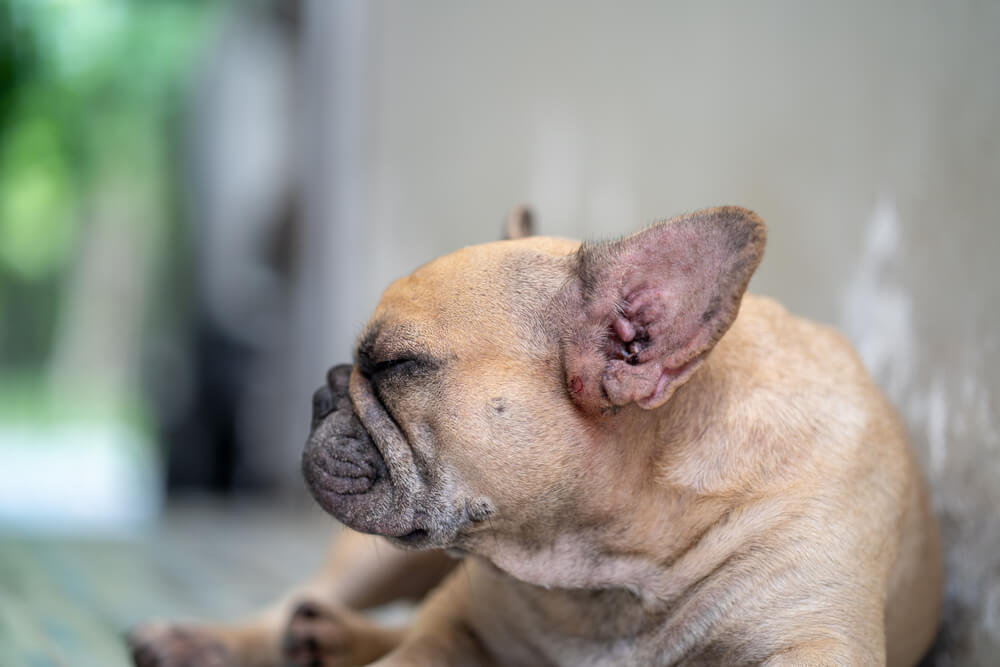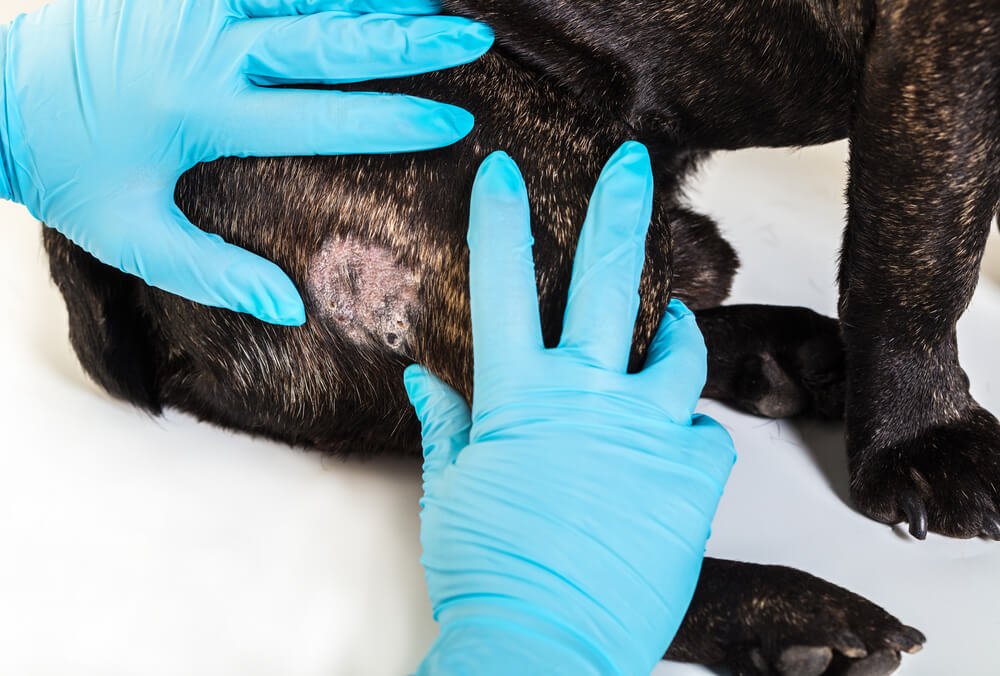
French Bulldogs have a very particular look. But sadly, all the wrinkles and excess skin come at a price. French Bulldogs are prone to a multitude of skin problems, from allergies and itchy ears to sweaty skin folds. Let’s find out more about French Bulldog dermatitis, the different types, and what you can do to help.
What are the different types of French Bulldog dermatitis?
Atopic dermatitis
Atopic dermatitis is skin inflammation and irritation caused by allergies like food, fleas, or pollen. It usually affects the skin of the paws, ears, muzzle, belly and groin, and armpit, but any part of the body where there’s skin can be affected. The skin usually becomes pink and you might notice your dog starting to scratch or lick because they are itchy. If the scratching and licking continue, your dog might end up with a bacterial infection of the skin.
Otitis (ear dermatitis)
Ear dermatitis is scientifically known as otitis externa. It usually occurs as part of atopic dermatitis and allergies, but can also be caused by swimming, hairy ear canals, bacteria or yeast infections, or growths within the ear.
Ear edge dermatitis
Ear edge dermatitis refers to scabby, scaly, or oozy skin around the margins of your dog’s ear flap. French Bulldogs appear to be particularly prone to this condition, which is also known as ear margin hyperkeratosis. It’s not fully understood why dogs develop this, but once it occurs it’s usually a life-long condition. It’s worth noting, though, that similar ear lesions can be caused by certain parasites and other health conditions, so speak to your veterinarian if you are concerned.
Skin fold dermatitis
French Bulldogs have lots of skin folds and wrinkles, especially around their face. Their over-breeding has meant that these skin folds have become even more pronounced, often causing painful eyes when the haired skin rubs against the eye surface, and sometimes obstructing the nostrils, making breathing more difficult. Aside from these issues, though, the deep folds are the perfect environment to be a breeding ground for bacteria and yeast. Skin fold dermatitis isn’t just smelly and unpleasant to look at, it’s also really painful and irritating for your pooch.
Moist dermatitis (hot spots)

The most common cause of moist dermatitis is allergies, however, they can also be caused by clipper rash, contact with irritant substances, or fleas.
Hot spots, also known as moist dermatitis, occur when a patch of skin becomes irritated or itchy. The skin barrier ends up being damaged by licking or scratching and matted hair usually covers the area, trapping the infection and making the problem worse. The most common cause of moist dermatitis is allergies, however, they can also be caused by clipper rash, contact with irritant substances, or fleas.
How can you Treat French Bulldog dermatitis?

The easiest allergies to manage are food allergies because the food allergen can be avoided – consider choosing dog food with limited ingredients.
The treatment for French Bulldog dermatitis depends on the type of dermatitis and the underlying cause. Here are some examples:
Atopic dermatitis
Since atopic dermatitis is caused by allergies, there is no cure, and affected dogs will always have allergies. However, if the allergy trigger is identified and avoided, the symptoms can be improved drastically and anti-itch or antibiotic medication might not be required. The easiest allergies to manage are food allergies because the food allergen can be avoided. Choosing dog food with limited ingredients, that doesn’t contain the allergen that is affecting your dog, should help to manage their symptoms. This could mean choosing a grain-free diet that is low in carbohydrates, or a diet with a single protein source, such as chicken, pork or beef, which are all great diet options for your frenchie.
Otitis
Ear infections need to be treated with antibiotics or anti-fungal medications. If the ears are very inflamed, a steroid anti-inflammatory might be prescribed, and your dog might need their ears syringed. However, if the underlying cause is an allergy, despite this treatment the problem will recur. Therefore, identifying any potential allergies and using limited-ingredient dog food to control any food allergies would be sensible.
Ear edge dermatitis
Ear edge dermatitis can be caused by a mite called Sarcoptes scabei, insect bites, excessive greasiness of the skin, or inflammation of the blood vessels (vasculitis). However, sometimes scabby lesions appear on the edge of the ear flap due to hyperkeratosis. The cause of hyperkeratosis is unknown. Once other causes have been excluded or treated, hyperkeratosis can be improved by using a lubricating cream to soften the scabs so that they come away.
Skin fold dermatitis

Even once the infection has cleared, though, the skin folds should be cleaned with salt water or an antibacterial solution like chlorhexidine and dried daily to prevent a recurrence.
Skin fold dermatitis must be treated with antibiotics, and the area should be bathed with salt water or an antibacterial solution like chlorhexidine. Even once the infection has cleared, though, the skin folds should be cleaned and dried daily to prevent a recurrence. If your dog’s skin is generally inflamed, or they’re showing other signs of allergies, changing their diet to avoid food allergens might also help.
Moist dermatitis
Hot spots are treated by clipping the fur away and cleaning the area thoroughly with an anti-bacterial solution. Often other medications are prescribed to reduce inflammation and itchiness and clear infection. Since many hot spots are caused by allergies, it’s a good idea to speak to your vet about allergy testing if your dog gets regular flare-ups. If the cause is a food allergy, a gradual change to a limited ingredient diet that avoids the allergen should help.
Summary
Most French Bulldogs are affected by dermatitis in some form or other, and most types of dermatitis can be caused by allergies. This means that many dogs could experience improved symptoms if they switch to dog food that is less likely to trigger their allergy. Depending on what food your dog is allergic to, they could benefit from a grain-free diet or a limited ingredient diet.
FAQ
How do you treat French bulldog dermatitis?
Many types of dermatitis can affect French Bulldogs and the treatment depends on the cause. However, many forms of dermatitis are caused by allergies, so if your dog is affected, they might improve if you change their dog food.
What can I put on my dog’s skin for dermatitis?
It’s best not to put anything onto your dog’s skin without checking with a vet first. Hot spots are sometimes treated with an ointment containing an anti-inflammatory and antibiotic, whereas other areas might be better treated with oral medication.
What does dermatitis in dogs look like?
The appearance of dermatitis can vary depending on the type. In general, the skin may be red, sore, oozy, smelly, or scabby and you might notice your dog licking or scratching the area.
Is dog dermatitis curable?
Many forms of dermatitis in dogs are curable, but sadly, an allergy cannot be cured. Instead, the allergen that your dog is allergic to should be avoided, if possible, by changing the diet, using regular parasite treatments, or avoiding certain plants. If the allergen is unavoidable, medication can be prescribed by a veterinarian.


